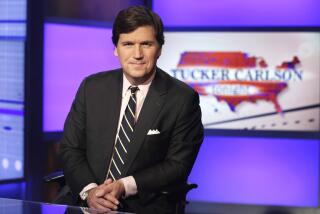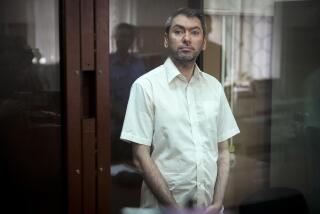He Expected More in Gorbachev Speech : Stalin’s ‘Terrible Truth’ Untold, Sakharov Says
- Share via
MOSCOW — Human rights activist Andrei D. Sakharov was quoted in a Soviet publication Wednesday as saying that “the whole terrible truth” about the Stalin era has not yet been told.
Sakharov, a physicist who was awarded the Nobel Peace Prize in 1975, was interviewed by the Moscow News before Soviet leader Mikhail S. Gorbachev spoke out against Stalin on Monday in a speech on the 70th anniversary of the Bolshevik Revolution.
On Wednesday, Sakharov told a Western reporter that Gorbachev did not tell “all the truth” about the years under Josef Stalin, who ruled from 1924 until his death in 1953.
“Not everything (in Gorbachev’s speech) satisfied me,” Sakharov said. “I expected, and I hoped, for more.”
Gorbachev said Stalin committed “enormous and unforgivable” crimes, but he said Stalin’s victims numbered in the thousands. Western historians believe that millions died or were killed as a result of Stalin’s collectivization of agriculture and his later purges.
First Extensive Interview
The Sakharov interview with the weekly Moscow News marked the first appearance of any extensive remarks by Sakharov in a central Soviet newspaper since he was denounced as a traitor and sent away to internal exile in Gorky in 1980. He was not allowed to return to Moscow until last December.
Sakharov described as encouraging Gorbachev’s announcement Monday that a Communist Party commission will be named to investigate Stalin’s actions and presumably to exonerate some of his victims.
In the interview with the Moscow News, Sakharov praised Nikita S. Khrushchev, who succeeded Stalin and exposed some of his excesses in the famous “secret speech” to the 20th party congress in 1956. He described Khrushchev as “an outstanding statesman” and said that too many Soviet people have been unduly critical of him.
In what was surely a revelation for most Soviet readers, Sakharov told the Moscow News about Klaus Fuchs, the German-born physicist who was engaged in nuclear weapons work in Britain and the United States and who confessed in 1950 to spying for the Soviet Union. Fuchs served almost nine years in a British prison before being released and allowed to go to East Germany.
Sakharov, who was deeply involved in the Soviet nuclear weapons program, is generally known as the father of the Soviet hydrogen bomb.
He criticized a recent Soviet documentary film for not mentioning the Fuchs case in connection with the execution of Ethel and Julius Rosenberg in the United States in 1953, after they were convicted of passing U.S. atomic secrets to the Soviet Union.
“We cannot suppress the fact that the execution of the Rosenbergs was the revenge of U.S. counterintelligence for the Klaus Fuchs affair,” he said.
Cuba Missiles Omitted
He also complained that the film omitted any mention of the Soviet missiles in Cuba that in 1962 brought the United States and the Soviet Union to the brink of nuclear war. Khrushchev finally withdrew the missiles in return for a pledge from President John F. Kennedy that the United States would not invade Cuba.
The Soviet Union, Sakharov said, has too often used “half-truth and suppression” in recounting events.
The Moscow News, which has been in the vanguard of the drive for greater public openness, has been lectured on occasion by Communist Party officials for going too far in its reporting.
Also in the issue that contains the interview with Sakharov is a strong attack on longtime Soviet leader Leonid I. Brezhnev, written by Daniel Granin.
The article says that Brezhnev allowed himself to be cut off from reality by “expert toadies at all levels” who on four occasions justified giving Brezhnev the highest Soviet award for bravery.
More to Read
Sign up for Essential California
The most important California stories and recommendations in your inbox every morning.
You may occasionally receive promotional content from the Los Angeles Times.













